- Home
- Tamara Leigh
LadyOfConquest:SaxonBride Page 2
LadyOfConquest:SaxonBride Read online
Page 2
Disdained by God who was not yet ready to forgive him his atrocities, he strode from the chapel. He would try again on the morrow, and the morrow after, and one day there would be peace for his soul. God willing.
Paying little heed to the cool wind and its whispers of winter, he left his head uncovered and crossed to the cloister where his studies awaited.
It was Brother Aelfred who intercepted him. “A messenger from Etcheverry is here to speak with you,” he said from deep within his hood.
All of Maxen went still. For two years there had been silence, as he had directed upon entering the monastery. What was so important Thomas should break his vow to leave him be? Had ill befallen the house of Pendery?
“The man awaits you at the outer house,” Brother Aelfred prompted.
Maxen inclined his head and changed course. As he approached the building, he saw the one who stood to the right of it. Facing opposite, wind sifting short black hair and ruffling fine garments, the man appeared to be appraising a section of the monastery’s outer wall. But as if sensing he was no longer alone, he turned.
Maxen halted, causing his heavy clerical gown to eddy about his feet. “Guy.”
The knight who had fought beside him at Hastings grinned. “No other.” He strode forward and gripped his friend’s arm. “It is good to see you.”
Demons roused, Maxen demanded, “Why have you come?”
Guy blinked, released his arm, and donned an impassive expression. “Let us talk inside.”
“Something is amiss at Etcheverry?”
“It is. I would not have come otherwise.”
“Thomas sent you?”
“Non, Christophe.”
As Maxen was a dozen years older than the youngest Pendery, that would make his brother a mere fourteen years of age. Thus, it boded ill that it was he who had directed Guy to the monastery.
“What of Thomas?” Maxen asked.
A long silence, then, “I am sorry. Your brother is dead.”
Maxen’s chest constricted. Another brother destined for the dirt. Another taken too young.
Memories he had struggled to bury rising from their graves, he saw the sloping meadow of Senlac, the strewn, ravaged bodies. He heard the Norman battle cries of Dex aie! and God’s help!, the Saxon cries of Holy Cross! and Out! Out! He smelled the spilled blood and felt the heat of bodies pressing in upon him. And then…Nils.
He wrenched himself back to the present. Thomas was dead, the same as Nils. Of his three brothers, only Christophe remained. “How did he die?”
“A Saxon woman. She whom he wished to wed.”
“A woman?” Maxen barked.
As if uncertain of how to deal with this man of God who, in that moment, must look anything but, Guy took a step back. “She claims she was the one, but Sir Ancel believes her rebel lover murdered Thomas.”
Maxen knew he should distance himself by accepting his brother’s death and returning to the chapel to pray for him, but he had to know. “For what did she betray Thomas?”
“Rhiannyn is the daughter of a villein who died at Hastings. She blames the Normans for the deaths of her father and two brothers in battle, and of her mother during a raid upon their village before the fighting.” Guy shook his head. “Thomas thought he could make her forget her loss by bringing her into the castle and grooming her to become his wife.”
Hands concealed in the long sleeves of his robe, Maxen closed them into fists in an attempt to squeeze the breath out of emotions he had not thought to experience again. “It was Thomas who lost,” he growled. “Everything.”
“So he did. Rhiannyn refused to wed him, and though he might have gained her consent by threatening her people, he was determined she would come to him willingly.”
“And she never did.”
Guy shook his head. “She slipped free of the castle a sennight past. Though the wood teems with Saxon rebels, Thomas rode after her without awaiting an escort. When we found him, he was dead—put through with a dagger.”
“What of the woman?”
“Rhiannyn was there. She claimed she killed your brother, but it is unlikely she possesses the strength or skill to down a warrior.”
“She protects her rebel lover.”
“Edwin Harwolfson, to whom she was betrothed before William claimed England’s throne.”
“Who is he?”
“The second son of the thane who possessed the lands King William awarded Thomas. As the only survivor of his family, he claims rights over Etcheverry, refuses to acknowledge a Norman as his overlord, and leads the Saxon rebels who abound in the wood of Andredeswald.”
“He murdered my brother for revenge.”
“For which he is more than qualified. A worthy adversary.”
“Is the uprising restricted to Etcheverry?”
“No longer. It touches other Pendery lands, and many villages are dying as the young and strong leave to join the rebellion. There are not enough to work the land and tend—”
“Tell me more of Harwolfson.”
Guy drew a deep breath. “He was a royal housecarle to King Edward before his death. Next, he served the usurper, Harold.”
Surprise sprang through Maxen. A housecarle who had not died with his king? According to Saxon tradition, no housecarle should leave the battlefield alive if his lord was killed. There could be no worse disgrace.
“Harwolfson does not limit his foul deeds to Normans who pass through the wood,” Guy continued. “He leads attacks against Etcheverry Castle and its sister castle, Blackspur. The first year, he set fire to both so often Thomas began replacing wood with stone.”
Returning to what was yet unknown, Maxen asked, “How is it Harwolfson did not die at Hastings?”
“The Saxons say that while Harold expired a hundred feet away, an old witch pulled Harwolfson from beneath the dead and breathed life back into him. Afterward, she took him from the battlefield and healed his wounds with magical words and herbs.”
“What do the Normans believe?”
Guy’s brow was momentarily disturbed, as if he was tempted to point out Maxen was also Norman. “They say Harwolfson is a coward and ran to the wood when his king fell.”
“What do you think?”
“Word abounds of his courage. And with my own eyes I have seen the wound he is said to have gained while fighting to protect his king. Though I dare not say it too loudly, methinks he did not take to flight.”
Maxen wondered if he had met the man. By invitation of the now deceased King Edward, who’d had a particular fondness for Normans, the Penderys had resided on English soil for nearly a quarter century. For this reason, the first language of the Pendery offspring was Anglo-Saxon, though they were equally fluent in Norman French. But following King Edward’s death, the Penderys had not supported Harold Godwinson’s claim to the throne. Instead, as commanded, they had taken up arms for their liege, Duke William of Normandy. So much bloodshed…
The images sharpening, as if yesterday he had thrust his sword into the blood-soaked soil of Senlac and walked away, Maxen silently raged. Curse Thomas for his obsession with the Saxon wench! Curse him for dying and leaving none but Christophe to take control of the Pendery lands!
“There is none but you,” Guy said.
Maxen jerked. “What speak you of?” Not that he did not know. He just did not care to know.
“Christophe cannot do it, nor does he wish to. If what belongs to the Penderys is to remain theirs, you must come out.”
Leave his refuge that with prayer might someday free him of his demons? “I cannot. My vows are spoken. My life is here.”
“A petition has been dispatched to King William. If he agrees, which he would be a fool not to, you will be freed of your vows—at a price, of course.”
Further reminded of who he was and what he had done, Maxen struggled to contain emotions that might once more make of him an animal. When he had entered the monastery, he had determined he would never again know the outside world in
which he had become merciless and bloodthirsty—as had been expected of him to prove his family’s allegiance to Duke William. More, he had given himself to the Church to ensure the world beyond these walls would never again suffer him.
“Christophe sent the petition?” he growled.
Guy swallowed loudly. “I did—with your brother’s blessing.”
Maxen stepped toward him. “You?”
“I had to, not just for our friendship, but because I could not bear to see all lost.”
“But Christophe—”
“I have told you. He is not fit to lord Etcheverry, nor Trionne once your father passes on. If you do not come out, it will be Sir Ancel Rogere who controls Pendery lands. At best, Christophe will be a figurehead.”
“Rogere?”
“Thomas’s friend, whom he intended to make lord of Blackspur Castle. Surely you remember him?”
He did. Thomas had become acquainted with the Norman prior to the Battle of Hastings. A landless noble, Rogere had sought his fortune fighting alongside Duke William in the quest for the English crown. However, it was told he had fallen early in battle, and a handful of coins had been his only reward.
“Continue,” Maxen ordered.
“It is he who sits at high table in Christophe’s stead. He who directs the household knights and to whom the steward answers. He who intends to seal his power by gaining your father’s permission to wed your sister.”
Maxen turned away. All was lost. Just as duty had bound him to defend his family’s holdings at Hastings, he must do so at Etcheverry, even at the cost of the soul he had struggled to save these two years. Suddenly so weary he longed to drop his head between his shoulders, he asked, “When do you expect the king’s reply?”
“He should have my petition in hand by the morrow. Thus, his answer will likely arrive within a sennight.”
Maxen knew William would not dally over the decision, nor did he question what the decision would be, for the king had conferred the barony on Thomas after Maxen had refused it and entered the monastery.
“Does Sir Ancel know what you do?” Maxen asked.
“He does not, my lord.”
My lord. So, neither did Guy doubt what William would decide.
Maxen’s anger flared, and though he forced it down, it simmered beneath his surface.
“I will ready myself.” He pivoted.
“Maxen?”
He looked over his shoulder.
Guy’s smile did not reach his eyes. “It is for the better.”
“For the house of Pendery. But for me?” He shook his head. “This is where I belong, Guy.” And she who had forced him from his sanctuary would pay for her faithlessness. “The woman,” he said, “tell me she yet lives.”
“She does. Sir Ancel would have put her to death, but it is the one thing upon which Christophe will not be moved.”
“Why?”
“Regrettably, he is as enamored of her as was Thomas.”
Foolish boy. Directly or not, she was responsible for their brother’s death. “She yet dwells within the castle?”
“She does, though no longer in the comfort Thomas provided her. Sir Ancel holds her in a prison cell.”
Rightly so, Maxen mulled and realized the Maxen of old had edged out the Maxen he had struggled to become. In that moment, the vows he had taken seemed hollow. All because of a treacherous woman.
So be it, he conceded. If I must give up the monastery, forget compassion, charity, and forgiveness. Forget every last one of the kindnesses I have sought and been taught. Forget all!
And God help the Saxon wench.
CHAPTER THREE
Rhiannyn sprang to her feet, but there was no refuge within her prison and no possibility of getting past the man-at-arms advancing on her.
Pressing herself back against a wall, she demanded, “What do you want?”
He smirked and clamped a hand on her arm. As he dragged her from the cell, she twisted and dug her heels into the dirt floor.
Naming her the vilest thing one might call a woman, he heaved her onto his shoulder.
Lungs nearly emptied of air, she clawed at his back, a puny defense which seemed not to affect him. Defeated—for the moment only, she promised herself—she lifted her head, and through her tangled hair, saw the cell recede and the dim passageway open wide as if to swallow her.
Preferring her own darkness, she squeezed her eyes closed and did not open them again until she was dropped onto a stool. Grabbing the splintered seat to keep her balance, she tossed her head back. “What is this?” she demanded.
The man-at-arms stepped aside, revealing she sat in the center of an unlit room, and amid the shadows ahead was the figure of a man.
“Bind her,” that one said in Norman French.
Rhiannyn leapt up.
And was shoved back down. As she resumed her struggle, the man-at-arms forced her arms behind her, clasped her wrists together, and lashed them with coarse rope. Holding her to the stool with a hand that bit into her shoulder, he came back around and pulled a ragged piece of cloth from beneath his belt.
He thrust his face near hers. “Unless you wish me atop you, wench, you will be still.” He released her shoulder and began binding the cloth around her eyes.
Though horrified at being denied her vision, she did not move, certain he would take pleasure in stretching himself upon her.
Is this to be my end? she wondered. Though she knew she deserved no better for the part she had played in Thomas’s death, she silently counseled, Wait, Rhiannyn. Wait and listen and be ready.
Hearing the man-at-arms’ retreat, straining to see through the blindfold’s dense weave, she waited.
The long silence was broken by the heavy tread of boots, evidencing the man in shadow was of good size.
The nearer he drew, the more her skin prickled, and when he halted before her, the sensation was so strong she thought it possible he touched her.
“Comfortable?” he asked in Norman French, his voice warming her ear, the scent of sweat and horse and leather filling her nostrils.
She turned her head, and against her cheek felt the rasp of a lightly bearded jaw. “Who are you?”
“Who do you wish me to be, Rhiannyn of Etcheverry?”
Was that harsh, dark voice truly his? Or did he affect it to frighten her? “It matters not what I want. You are Norman. Thus, we are enemies.”
“Norman or no, I have the power to be your judge. Or your champion.”
The latter was a lie, but she would play the game. “Which will you be?” she asked. “Norman or no?”
“It is for you to decide.”
He wanted something from her, doubtless the same as Sir Ancel. But though he dangled her life before her, she would not give him Edwin.
His hand closed over her lower jaw, thumb pressed into the hollow beneath her cheek. “I would know where your lover dwells.”
Heart quickening in anticipation of brutality, she prayed it would be no worse than Sir Ancel’s visits to her cell that left her bruised and aching.
“As I have no lover, I know not of whom you speak,” she said and steeled herself for the blow.
“Edwin Harwolfson.”
“Not my lover. Nor do I know where he is.” Now the blow, the snap of teeth, the bloodying of lip and nose.
“Methinks you lie.”
Not with regard to her virtue. Further agitated that he had yet to strike her, fearful the blow would be tenfold worse for the delay, she said, “If it is Thomas’s murderer you seek, it is not Edwin you want.”
“Truly? Then enlighten me.”
Dear Lord, she silently entreated, he will make of me a bloody mess. Or a corpse.
But if it ended her soul-tearing remorse and Sir Ancel’s beatings, his attack would be welcome, would it not?
She drew breath through her nose. “You want me. I killed him.” And now she would feel the spit of his obscenities, the back of his hand, the punch of his fists, mayhap a long fall in
to darkness out of which she would not escape.
Derisive laughter made her startle. “A wee Saxon wench downed an esteemed knight of King William? You profane Thomas’s memory with such tales, Rhiannyn.”
It was that or the massacre of her people.
“No matter what you tell,” he continued, “you will not convince me Harwolfson did not kill him.”
She shook her head. “I vow, he did not—could not have. Thomas did great injury to Edwin’s sword arm and was about to put him through when…” There was the truth. Here was the lie. “…I planted the dagger.”
“Do you think me a fool?”
She did not, but why could he not simply punish her and leave the others be? Accepting she wasted her breath, she asked, “Why will you not let me see you?”
No response.
“Are you so unsightly none can stand to look upon you?”
Naught.
“Are you Thomas’s father?”
He drew so near his mouth brushed her ear. “Non, Rhiannyn, I am not our father.”
It took her no moment to understand, but she did not believe it. “It cannot be. Christophe and his sister are all who remain.”
He stepped nearer, and she felt his leg alongside hers. “There is also Maxen Pendery.”
If what he said was true, why had there been no mention of another brother besides the one killed at Hastings? Neither Thomas nor Christophe had spoken of this one.
Rhiannyn was about to challenge his claim when she remembered Thomas calling upon his brother to avenge him. She had thought it was gentle Christophe to whom he had cried out, though it had made no sense. But this day, sense was made. He had summoned Maxen. And Maxen had come.
“I give you a choice, Rhiannyn. Yield up my brother’s murderer, or your people will suffer.”
Meaning he would pursue and slay those who took refuge in Andredeswald, the very thing she had tried to avoid by claiming she had killed Thomas. Sir Ancel had threatened the same, but she feared this man’s threat more. And yet, it changed nothing. If she revealed an unseen person had murdered his brother, he would not believe her and still work his revenge upon the Saxons.

 FEARLESS: Book Two: Age of Conquest
FEARLESS: Book Two: Age of Conquest BOUNDLESS: A Medieval Romance (AGE OF CONQUEST Book 6)
BOUNDLESS: A Medieval Romance (AGE OF CONQUEST Book 6) Lady Betrayed
Lady Betrayed Merciless
Merciless Nowhere, Carolina
Nowhere, Carolina Virgin Bride
Virgin Bride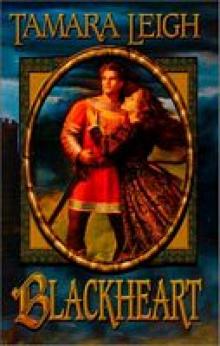 Blackheart
Blackheart Restless in Carolina
Restless in Carolina THE AWAKENING_A Medieval Romance
THE AWAKENING_A Medieval Romance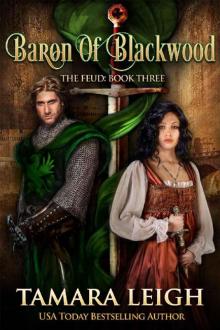 Baron of Blackwood
Baron of Blackwood Leaving Carolina
Leaving Carolina HEARTLESS: A Medieval Romance (Age of Conquest Book 4)
HEARTLESS: A Medieval Romance (Age of Conquest Book 4)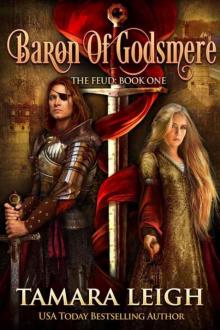 Baron of Godsmere
Baron of Godsmere Lady Of Eve
Lady Of Eve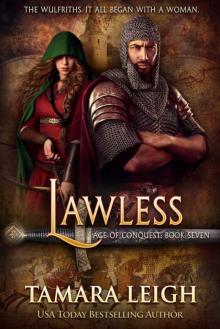 LAWLESS: A Medieval Romance (AGE OF CONQUEST Book 7)
LAWLESS: A Medieval Romance (AGE OF CONQUEST Book 7) Lady Of Fire AKA Pagan Bride
Lady Of Fire AKA Pagan Bride The Yielding (Age of Faith)
The Yielding (Age of Faith) The Redeeming: Book Three (Age of Faith)
The Redeeming: Book Three (Age of Faith) LADY UNDAUNTED: A Medieval Romance
LADY UNDAUNTED: A Medieval Romance THE RAVELING: A Medieval Romance (Age of Faith Book 8)
THE RAVELING: A Medieval Romance (Age of Faith Book 8) LADY EVER AFTER: A Medieval Time Travel Romance (Beyond Time Book 2)
LADY EVER AFTER: A Medieval Time Travel Romance (Beyond Time Book 2)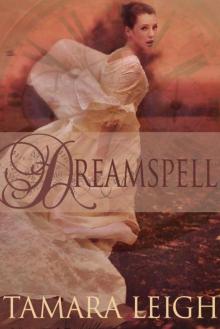 Dreamspell
Dreamspell The Unveiling (Age of Faith)
The Unveiling (Age of Faith) THE RAVELING
THE RAVELING Splitting Harriet
Splitting Harriet Age of Faith 4 - The Kindling
Age of Faith 4 - The Kindling THE RAVELING_A Medieval Romance
THE RAVELING_A Medieval Romance Perfecting Kate
Perfecting Kate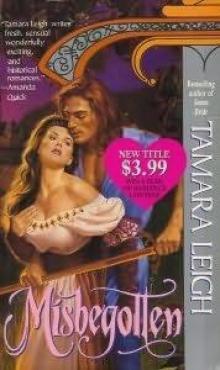 Misbegotten
Misbegotten THE VEXING: A Medieval Romance (AGE OF FAITH Book 6)
THE VEXING: A Medieval Romance (AGE OF FAITH Book 6)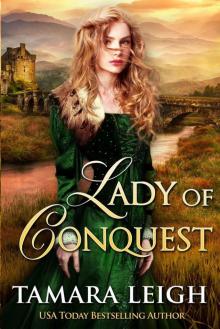 LadyOfConquest:SaxonBride
LadyOfConquest:SaxonBride